Write a wrapper class implementation of a Stack that uses th
Write a wrapper class implementation of a Stack that uses the ExtendableVector class. Only need to implement these public methods:
#include “ExtendableVector.h”
template
class ExtendableVectorStack {
public:
ExtendableVectorStack (); // constructor: no need to specify capacity!
int size(); // number of items in the stack
bool empty(); // is the stack empty?
E& top(); // get the top element
void push(E& e); // push element onto stack
void pop(); // pop the stack
private:
// “wrap” the ExtendableVector here along with other variables necessary to implement the public methods
};
#include <stdexcept>
#include <algorithm> // needed for std::max in ExtendableVector::insert()
using namespace std;
const int DEFAULT_VECTOR_CAPACITY = 100;
template
class ExtendableVector {
public:
// length copies of default_value
ExtendableVector(int length = DEFAULT_VECTOR_CAPACITY) {
if (length <= 0) throw invalid_argument(\"length <= 0\");
capacity = length;
numberOfElements = 0;
elements = new ELT[length];
}
// copy constructor
ExtendableVector(const ExtendableVector& a) {
capacity = a.capacity;
numberOfElements = a.numberOfElements;
elements = new ELT[numberOfElements];
for (int i = 0; i < numberOfElements; i++) {
elements[i] = a.elements[i]; }
}
~ExtendableVector() { delete[] elements; }
// assignment operator from another extendable vector
ExtendableVector& operator=(const ExtendableVector& theVect) {
if (this != &theVect) { // avoid self-assignment
delete[] elements; // delete old array
capacity = theVect.capacity; // set the capacity
elements = new ELT[capacity]; // allocate new array
numberOfElements = theVect.numberOfElements; // set the size
for (int i = 0; i < numberOfElements; i++) {
elements[i] = theVect.elements[i]; // copy the vector contents
}
}
return *this;
}
int size() { // returns number of elements
return numberOfElements; }
bool empty() { // is vector empty?
return (numberOfElements == 0); }
int getCapacity() {
return capacity;
}
ELT& operator[](int index) { // element at index i
return at(index);
}
ELT& at(int index) { // element at index i
if ((index < 0) || (index >= numberOfElements)) {
throw range_error(\"index out of bounds\"); }
return elements[index];
}
void erase(int i) { // remove element at index i
for (int j = i+1; j < numberOfElements; j++) {
elements[j-1] = elements[j]; // shift elements down
}
numberOfElements--; // one fewer element
}
void reserve(int N) { // reserve a least N slots
if (capacity >= N) { // already big enough
return;
}
ELT *newArray = new ELT[N]; // allocate bigger array
for (int j = 0; j < numberOfElements; j++) {
newArray[j] = elements[j]; // copy contents to new array
}
if (elements != nullptr) { // discard old array
delete [] elements;
}
elements = newArray; // have extendable array point to new array
capacity = N; // set new capacity
}
void insert(int index, ELT value) {
if (index < 0) throw range_error(\"index out of bounds\");
if (numberOfElements >= capacity) // overflow?
reserve(max(1, 2 * capacity)); // double current array size
for (int j = numberOfElements-1; j >= index; j--) {
elements[j+1] = elements[j]; // shift elements up
}
elements[index] = value;
numberOfElements++;
}
private:
int capacity; // current array size
int numberOfElements; // number of elements in vector
ELT *elements; // array storing elements
};
Solution
Hi, Please find my implementation.
Please let me know in case of any issue.
#include “ExtendableVector.h”
template
class ExtendableVectorStack {
public:
ExtendableVectorStack (); // constructor: no need to specify capacity!
int size(); // number of items in the stack
bool empty(); // is the stack empty?
E& top(); // get the top element
void push(E& e); // push element onto stack
void pop(); // pop the stack
private:
ExtendableVector *stack;
};
// Implementation
ExtendableVectorStack::ExtendableVectorStack(){
// creating object of ExtendableVector
stack = new ExtendableVector();
}
// number of items in the stack
int ExtendableVectorStack::size(){
return stack->size(); // calling ExtendableVector\'s size() method
}
// is the stack empty?
bool ExtendableVectorStack::empty(){
// calling ExtendableVector\'s empty() method
return stack->empty();
}
// get the top element
E& ExtendableVectorStack::top(){
if(empty()){
throw range_error(\"index out of bounds\");
}
return stack->at(size()-1); // getting top element
}
// push element onto stack
void ExtendableVectorStack::push(E& e){
stack->insert(size(), e); // calling insert method of ExtendableVector
}
// pop the stack
void ExtendableVectorStack::pop(){
stack->erase(size()-1); // erasing top element
}
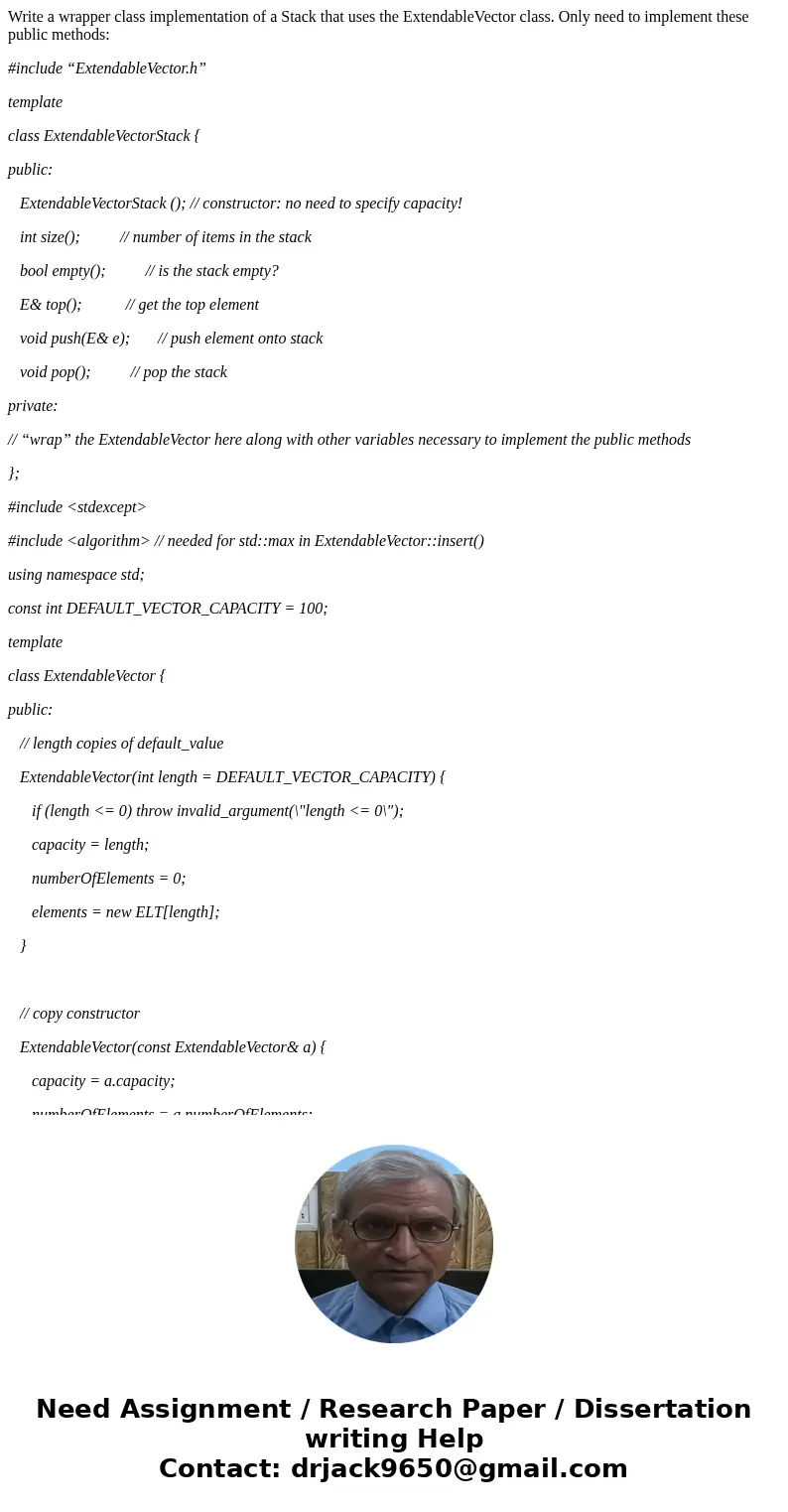
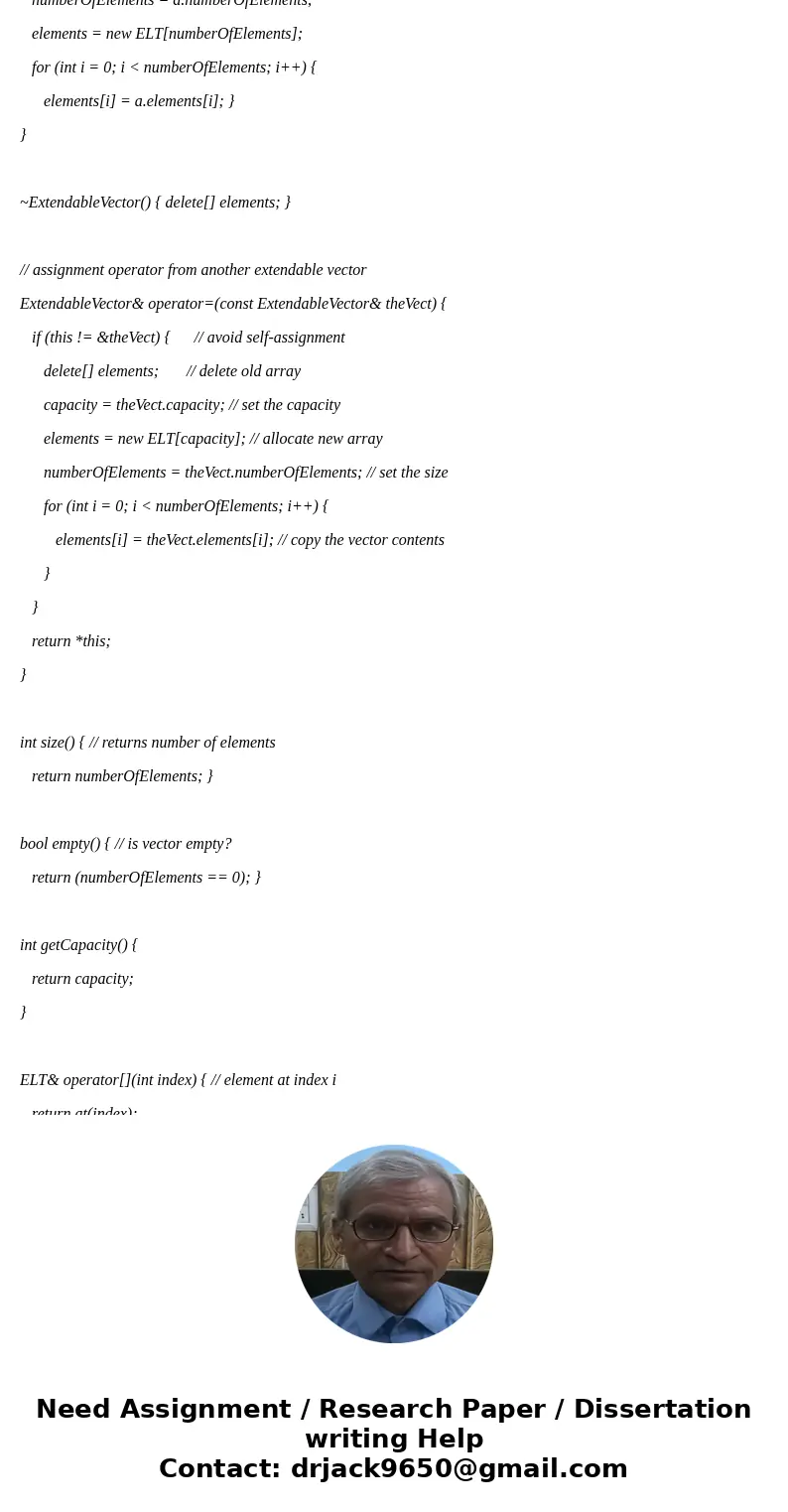
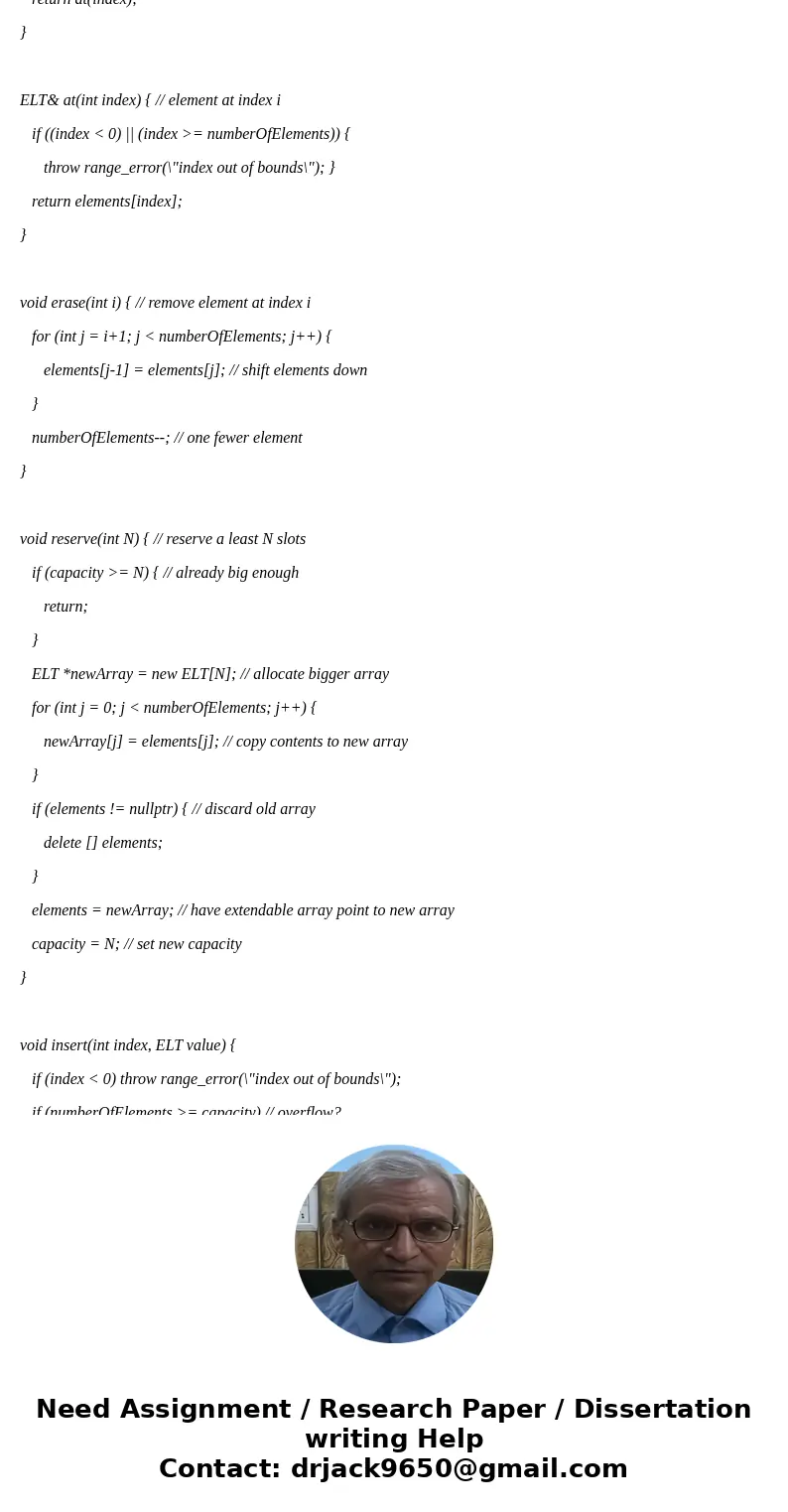
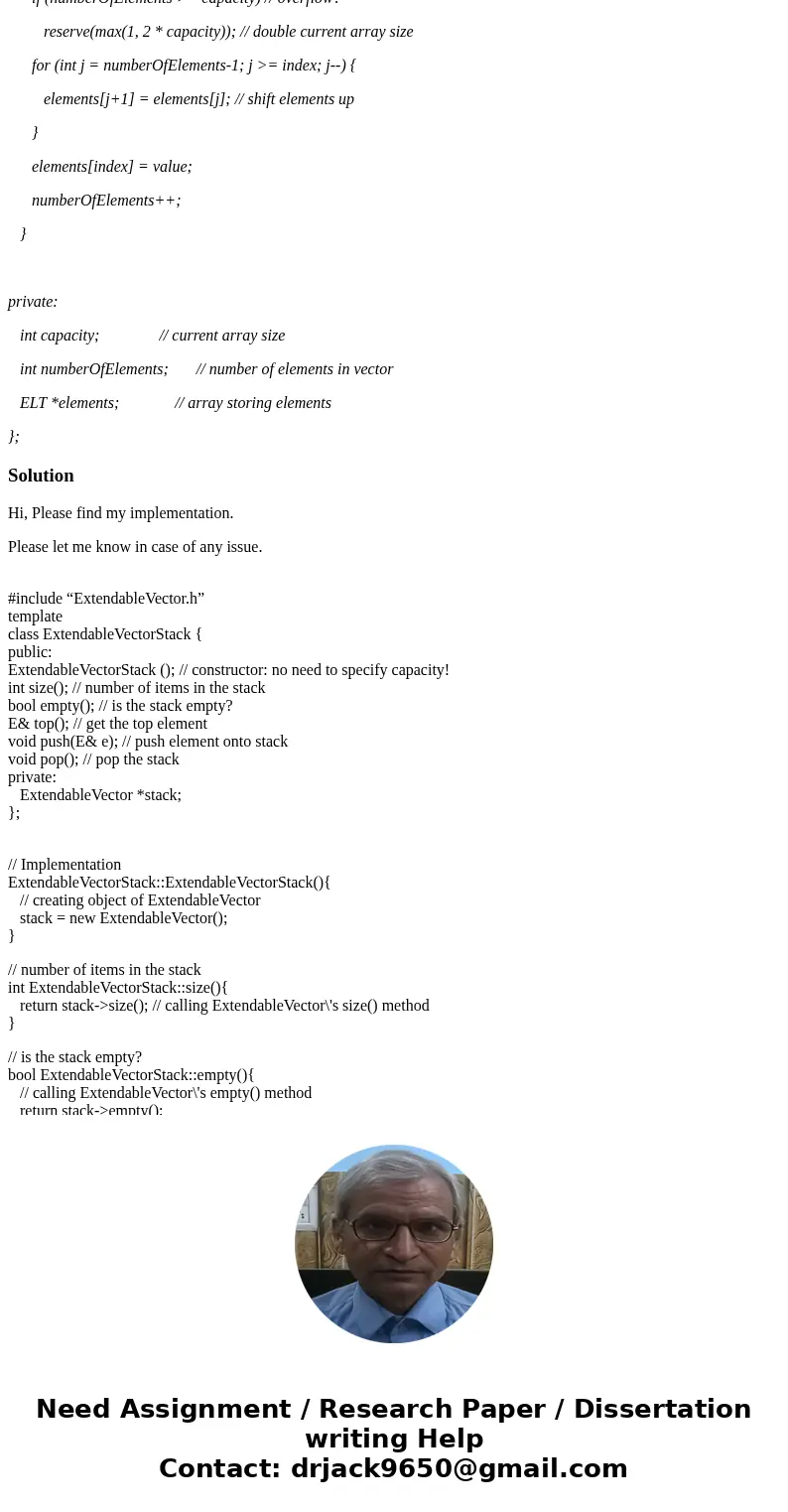
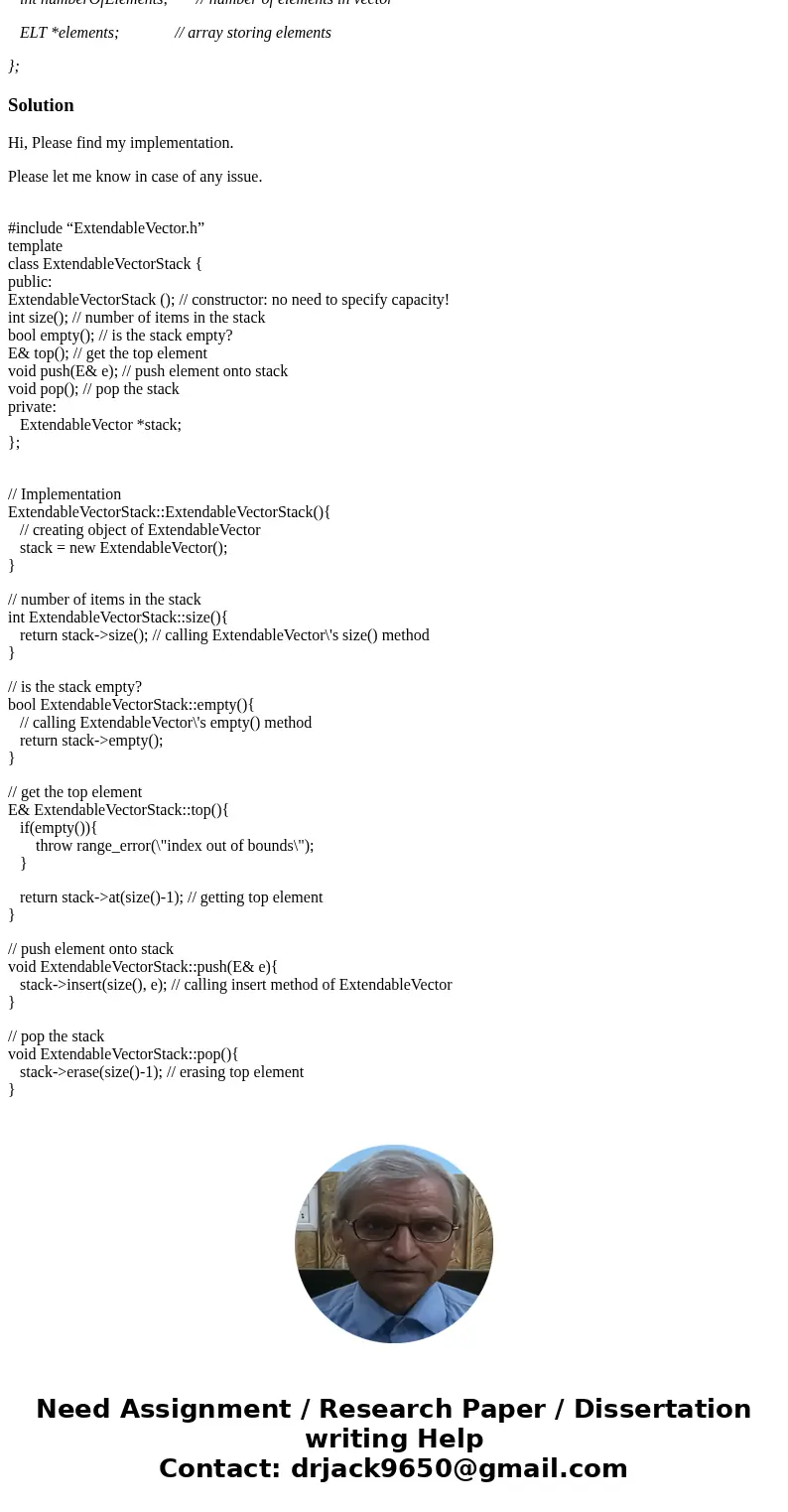
 Homework Sourse
Homework Sourse